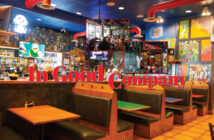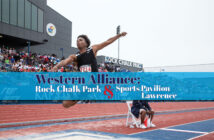| story by | |
| photos by | Steven Hertzog |
| OPEN A PDF OF THE ARTICLE |
These businesses serve our community and beyond with their unique products and services, boosting our economy.

A Microtech Super Computer
Usually, when traveling down Wakarusa, we are on a mission to get my daughter to soccer practice or a game not looking at the various companies that are located in this West Lawrence area. However, there are tales about companies that are doing unique or interesting work, quietly going about their business making positive changes in our community and beyond.
My assignment was to find out about a few of these companies around Wakarusa Street, to pull back the curtain on any mysteries and to note anything that would be of interest.
Supercomputers Among Us

A Dana Chang President and CEO of Microtech/ Atipa Technologies; Building a super computer in their shop
In the mid ’80s, Dana Chang graduated from the University of Kansas (KU) with a focus in computer science and, in 1986, started Microtech Computers with a partner. She has served as its president and CEO since 2019. Microtech has been located in two different locations, both near Wakarusa Street, since its inception. The company began by creating customized, high-end workspaces and computer labs for its customers, which include university research facilities, government agencies and other organizations with specific requests about how their computing systems are assembled. By 2002, Microtech had started Atipa Technologies, producing supercomputers.
What is a supercomputer? “It’s a lot of servers connected together to build a supercomputer,” Dana explains, “with a high-speed interconnect, a high-speed network. If a computer runs by itself, it has limited power; but if you link hundreds of computers together, it becomes extremely powerful.”
Supercomputers require a lot of power and horsepower to be able to compute the data and perform the tasks they are given. Microtech also developed the software that allows the parts to communicate effectively to support the supercomputer, which are hosted at a data center, or a grouping of supercomputers. There could be hundreds of supercomputers in one data center.
When you think about data centers, you might think of images of a computer from the 1960s that would take up an entire room. However, each supercomputer takes up little space. The servers are very high density, and as Chang notes,“[They are] about the size of an extralarge pizza box, 19 inches wide by 26 inches deep by 4 inches tall.” A data center may have 20 to 24 servers in a space. Now, cue images from movies with black boxes in a room and light pulsing on the front of each box.
A new generation of 192-CPU (Central Processing Unit) cores in a “pizza box” from AMD are reported to be available in 2023. These new-generation processors save more energy, making them much more environmentally friendly, requiring fewer computers and saving power and packaging boxes.
Besides animation studios such as Pixar, many other companies and government agencies use supercomputers for many different applications. Some Microtech clients include the Department of Energy, the Department of Defense, NASA, a large number of university laboratories and Fortune 1000 companies. Some examples of supercomputers in use include branches of scientific research, weather prediction, biochemistry, medical imaging and oil and gas. The company has clients all across the United States, and most of its work is in the U.S., but some of its clients have locations in other countries.

Jeff Sigler, owner of Sigler Pharmacy; Sigler Pharmacy is one of the few local pharmacies to make compounds
Where Everyone Knows Your Name
Sigler Pharmacy doesn’t have a supercomputer; however, the industry in which it performs has certainly benefited from their use. There is plenty of cutting-edge technology upon which the pharmacy relies, and it is focused on providing small-town, personalized services in a mid-sized city.
Getting to know about Sigler clients and their families through sincere care not only helps the pharmacy offer more holistic support but also provides better services. The pharmacy offers most of the same services you might find in a corporate-owned chain drugstore, including free delivery and competitive pricing. Because it’s independent, Sigler offers flexibility and the ability to think outside of the box, as well as a personal, caring touch.
Jeff Sigler, PharmD, founded Sigler Pharmacy in 2005 and has his roots in independent pharmacies. His first pharmacy job was at Raney’s Drug Store in downtown Lawrence, where he worked for 10 years. He worked as the manager for the Hy-Vee pharmacy for 10 years, as well. Originally from Olathe, Kansas, Sigler completed prepharmacy courses at Emporia State University and graduated with a bachelor’s degree in pharmacy, and his Doctor of Pharmacy from the University of Kansas.
The first Sigler location opened on Sixth Street and is currently the busiest of the two Lawrence stores because of its visibility, which is accessed off Folks Road, just west of Capital Federal Bank, at 4525 W. Sixth St. The West location is inside of Lawrence Family Medical Practice at 4951 W. 18th St., west off of Wakarusa and south off 18th..It’s tucked back behind a cluster of commercial buildings. The drive-through pharmacy is extremely easy to access, Sigler says, and the staff is committed to personal and quick service, as well as getting the customer in and out quickly. Clients come from as far as Paola and Eudora because of Sigler’s reliability, care and service.
As he points out, “A lot of (this service) is just being respectful of our patients and their time. We know their time is valuable. We want to do everything we can to make their visit pleasant and quick so they don’t have to wait.”
In addition to providing services to its customers, the pharmacy likes to give back to the community. During the COVID-19 pandemic, it supplied vaccinations at retirement homes at the request of Douglas County. Working with volunteers at Theatre Lawrence, it offered clinics to those wanting to be vaccinated. The KU School of Pharmacy asked the pharmacy to set up a clinic, as well. In addition, the pharmacy provides curbside COVID-19 testing at its locations. It has dispensed close to 40,000 vaccines since they have been offered.
Be on the lookout for a new Sigler Pharmacy location, which will open in the somewhat-near future at 11th and Vermont streets, in the former Capital Federal building. It feels like coming full circle for Sigler from when he worked downtown at Raney’s Drugs at his first pharmacy job.
“Downtown off of Mass. Street, with a drive-through … which I think will be really important,” Sigler says. “An independent pharmacy in downtown Lawrence, that was really one of my dreams. It’s near and dear to my heart.”
Building Communities
Landplan Engineering is an offshoot of the 1970s landscape architectural company Peters, Kubota and Glenn. At the time, it was difficult to find engineering companies that understood the importance of land planning and that it should be incorporated into their services, explains Philip Struble, the last partner at the firm who eventually became the owner in the 1980s. Brian Kubota had the idea to start a business for this missing market, naming it Landplan Engineering. In the 1970s, most engineers were providing square, block-shaped streets. Kubota looked at the natural form of the land and worked with the existing features.
“We still honor that (working with the land). We put a lot of emphasis that what we do needs to match the ground,” Struble explains. “We want to be supportive of everything that goes on around it (the land) versus fighting it. In engineering, we can always move things around … we don’t want to do that. We want to work with what we have. Have it fit the natural environment. It’s probably the original meaning of the word sustainable.”
“We call ourselves urban engineers … We like to design neighborhoods,” he continues. “Most engineers think about plat lots (a planned or physical piece of land) and build streets. We want to build a community. Build a place that is walkable—a place where people want to live.”
Landplan also designs shopping centers. Rather than focusing on designing a shopping center, its focuses on designing a place where people want to go—working through design challenges to help keep people safe in all types of traffic while still providing attractive landscaping, Struble says.
Change is part of the process for land planning. Not only do peoples’ needs for land change, but project needs may shift in the middle of a project or later. Landplan works with the City to make adjustments needed to fit the current needs of a project, Struble explains. Land-use models have changed over time, some with very good reasons. For example, the redesign of 23rd Street is part of a new plan that has a more protected turnoff with a frontage road and fewer direct turnoffs, which will help with traffic flow and reduce accidents. This type of improvement comes about over time as needs arise.
Landplan works as a liaison between the landowner and the regulating governments, he continues. When clients hire Landplan with an idea about what they want to do with their land, Struble and his team do the best they can within the restrictions and codes to make the customer’s ideas a reality.
There are many challenges in planning urban and suburban spaces. One example is the cul-de-sac. Cities find one issue after the next with them, including difficulties fitting fire engines, snow removal and trash pickup, in addition to other issues. On the other hand, developers love them because the lots cost more, ultimately bringing them more money. People like these types of areas for a number of reasons, Struble says, including a safer area for their children to play and the community they create. Landplan is working on some good solutions to these and other challenges.
Landplan Engineering has continued to grow, paying very close attention to the market trends and working with real estate agents and home builders. Its client base consists of those not looking to create the same project but to make something new and better than before. Overall, city governments are becoming more regulatory-oriented, which includes adding regulatory codes for new products such as solar panels or additions such as mother-in-law homes. However, Struble has seen and believes there are other ways cities can become creative in growth and learning to limit regulation while maintaining the urban planning ideas the city wants to promote.
Perhaps we need to get a supercomputer involved in figuring out some of these challenges. These issues come down to caring about our community, taking part, giving back, interacting and kindly communicating as we support one other in this amazing city, he adds. This is an opportunity to look for new, creative ideas without disposing of those that make our city a wonderful place to live and do business.
When you are driving down the streets of Lawrence, keep an eye out for businesses creating interesting and distinctive commerce. There may be sectors, services or products we didn’t even know existed. They are all around us and represent Lawrence here and around the world.




